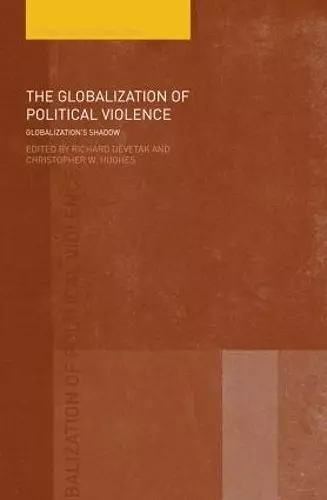The Globalization of Political Violence
Globalization's Shadow
Christopher W Hughes editor Richard Devetak editor
Format:Paperback
Publisher:Taylor & Francis Ltd
Published:20th Dec '07
Currently unavailable, and unfortunately no date known when it will be back
This paperback is available in another edition too:
- Hardback£160.00(9780415425339)

The events of the 11th of September 2001 revealed most dramatically that globalization has a shadow. While large sections of the world’s population enjoy the perceived benefits of globalization, others seek to utilize globalization for their own politically violent purposes. If 9/11 demonstrated anything, it is that globalization can as readily facilitate violence and insecurity as it can produce stability, prosperity and political order.
This edited volume offers important new methodological and multi-disciplinary insights into the study of globalization and political violence. It brings together studies from various disciplines in order to address the precise nature of the relationship between globalization and political violence as it seeks to offer new theoretical and empirical understandings of the types of actors involved in political violence, either as perpetrators or victims.
Examples of the studies include the changing character of state militaries and state-to-state conflict under globalization, the emergence of ‘new wars’ fuelled by globalization, the role of state militaries in intervention, new forms of violence directed by states against refugees and anti-globalization protesters, the role of terrorist actors post-9/11, networks for the proliferation of weapons of mass destruction and the rise of private military firms amongst others.
The Globalization of Political Violence will be of interest to students and researchers of politics, international relations, security studies and international political economy.
"Academics and pundits refer to the ‘dark side of globalization’. Some examine aspects of the linkages between globalization and political violence. None, however, match the accomplishment of this volume in considering the emergent forms of insecurity in such a comprehensive manner. Shifting the focus away from a purely state-centric approach, the contributors to this book examine the wide-ranging dimensions of violence with which scholars and policymakers will have to come to terms in forthcoming decades."
Simon Reich, University of Pittsburgh, USA
"Violent conflict in the 21st century no longer conforms to the Clausewitzean and Weberian models of war between vertically organized states. Rather it involves horizontally organized networks: loose transnational factions and the demonstration effect; civil and cross-border wars; translocal ethnic and religious conflicts; migration and diasporas; private military corporations and criminal mafias. States, international organizations and non-state actors are struggling to find horizontally organized responses, but are increasingly ineffective and overstretched. This book breaks new ground in addressing how the globalization of violence is reshaping the very structure of world politics."
Philip G. Cerny, Professor of Global Affairs, Rutgers University-Newark, USA
ISBN: 9780415425346
Dimensions: unknown
Weight: 476g
308 pages